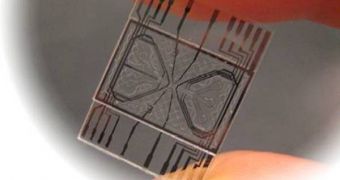One of the main reasons why mortality rates keep going up, and epidemics keep appearing in poor regions of the world is obviously the lack of sanitation. People consume tainted water and crops, which make them go sick. But the real disaster is that doctors, or other healthcare specialists, who are supposed to take care of them, are often deprived of the most basic medical tools to do so. A new microfluidic device may help ease that burden, as it can provide accurate blood tests at a low price.
According to a new paper published in this month's issue of the journal Lab on a Chip, researchers Hywel Morgan, a professor at the University of Southampton School of Electronics and Computer Science (ECS) Nano Research Group, and Donna Davies and Dr. Judith Holloway, both professors at the USouthampton School of Medicine, recently developed the new device, which is able to perform a white-cell differential count.
The new microfluidic single-cell impedance cytometer, AlphaGalileo reports, is able to use minute amounts of liquid to assess the number of specific cells inside them, in this case white blood cells (WBCs). The device is outfitted with a small channel, which contains two electrodes. These electrodes measure the electrical properties of each cell in the sample passing between them. This allows them to figure out what type of cells each of the ones passing by corresponds to, and to provide a number for the targeted ones, the researchers explain.
The new lab-on-a-chip is able to identify all the three main types of WBCs, including T lymphocytes, monocytes and neutrophils. “At the moment if an individual goes to the doctor complaining of feeling unwell, a blood test will be taken which will need to be sent away to the lab while the patient awaits the results. Our new prototype device may allow point-of-care cell analysis which aids the GP in diagnosing acute diseases while the patient is with the GP, so a treatment strategy may be devised immediately. Our method provides more control and accuracy than that what is currently on the market for GP testing,” Morgan explains.

 14 DAY TRIAL //
14 DAY TRIAL //